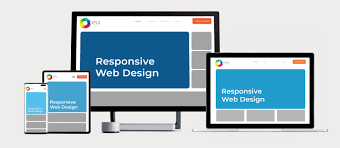The Power of Responsive Website Development
In today’s digital age, having a responsive website is no longer just an option – it’s a necessity. With the proliferation of smartphones, tablets, and various screen sizes, ensuring that your website looks and functions flawlessly across all devices is crucial for reaching and engaging your audience.
Responsive website development involves creating websites that adapt and respond to the user’s device, providing an optimal viewing experience. This means that whether someone accesses your site on a desktop computer, a smartphone, or a tablet, they will have a seamless and user-friendly experience.
One of the key benefits of responsive design is improved usability. Users don’t have to pinch and zoom to view content or struggle with distorted images and text. A responsive website adjusts fluidly to different screen sizes, making navigation intuitive and content easily accessible.
Moreover, responsive websites are favoured by search engines like Google. With mobile-first indexing becoming the norm, having a responsive site can positively impact your search engine rankings. This means better visibility for your website and increased traffic from organic searches.
From a business perspective, responsive design can lead to higher conversion rates. When users have a positive experience on your site – regardless of the device they use – they are more likely to stay longer, engage with your content, and ultimately convert into customers.
As technology continues to evolve, having a responsive website is not just about keeping up with trends; it’s about future-proofing your online presence. By investing in responsive website development, you are ensuring that your site remains relevant and effective in the ever-changing digital landscape.
At [Your Company Name], we specialise in creating customised responsive websites that captivate audiences across all devices. Contact us today to learn how we can help you elevate your online presence with responsive design.
Understanding Responsive Website Development: Key Questions and Answers
- What is responsive website development?
- Why is responsive design important for websites?
- How does responsive design improve user experience?
- What are the benefits of having a responsive website?
- How can I make my website mobile-friendly?
- Is it necessary to have a responsive website in today’s digital landscape?
What is responsive website development?
Responsive website development refers to the process of creating websites that are designed to adapt and respond to different screen sizes and devices. In essence, a responsive website dynamically adjusts its layout, content, and images to ensure optimal viewing and user experience across desktops, laptops, smartphones, and tablets. By employing responsive design techniques, websites can seamlessly scale and reformat their elements to fit the screen size of the device being used, providing users with a consistent and user-friendly interface regardless of how they access the site.
Why is responsive design important for websites?
Responsive design is crucial for websites because it ensures optimal user experience across various devices. With the increasing use of smartphones and tablets, users expect websites to be easily accessible and visually appealing on any screen size. Responsive design adapts the layout and content of a website to fit different devices seamlessly, eliminating the need for separate mobile versions. This not only enhances usability but also boosts search engine rankings, as search engines favour mobile-friendly sites. Ultimately, responsive design is key to engaging users, improving conversion rates, and future-proofing your online presence in today’s digital landscape.
How does responsive design improve user experience?
Responsive design plays a pivotal role in enhancing user experience by ensuring that websites adapt seamlessly to various devices and screen sizes. This means that users can access the same content and functionality regardless of whether they are on a desktop, tablet, or smartphone. By providing a consistent and user-friendly experience across all platforms, responsive design eliminates the need for manual resizing or zooming, making navigation intuitive and content easily accessible. This improved usability leads to higher engagement levels, increased time spent on the site, and ultimately, a more positive interaction with the brand.
What are the benefits of having a responsive website?
Having a responsive website offers a multitude of benefits that are essential in today’s digital landscape. Firstly, a responsive design ensures that your website looks and functions seamlessly across all devices, providing users with a consistent and user-friendly experience. This adaptability not only improves usability but also boosts search engine rankings, as search engines favour mobile-friendly sites. Additionally, a responsive website can lead to higher conversion rates by keeping visitors engaged and making it easier for them to navigate your content. By investing in a responsive website, businesses can future-proof their online presence and stay ahead in an ever-evolving digital world.
How can I make my website mobile-friendly?
To make your website mobile-friendly, you can start by implementing responsive design principles. This involves creating a flexible layout that adapts to different screen sizes and resolutions, ensuring that your content is displayed optimally on mobile devices. Additionally, you should prioritise mobile usability by simplifying navigation, using larger touch-friendly buttons, and optimising loading times for faster performance on mobile networks. It’s also important to test your website across various devices and browsers to ensure a consistent user experience. By focusing on responsive design and mobile usability, you can enhance the accessibility and engagement of your website for users on smartphones and tablets.
Is it necessary to have a responsive website in today’s digital landscape?
In today’s dynamic digital landscape, having a responsive website is not just recommended – it is essential. With the increasing use of mobile devices for browsing the internet, a responsive website ensures that your content is accessible and engaging across all screen sizes. By providing a seamless user experience regardless of the device being used, a responsive design can significantly impact user engagement, search engine rankings, and ultimately, the success of your online presence. Embracing responsive website development is not merely a trend but a strategic decision to future-proof your website and maximise its effectiveness in reaching and connecting with your target audience.

Leave a Reply